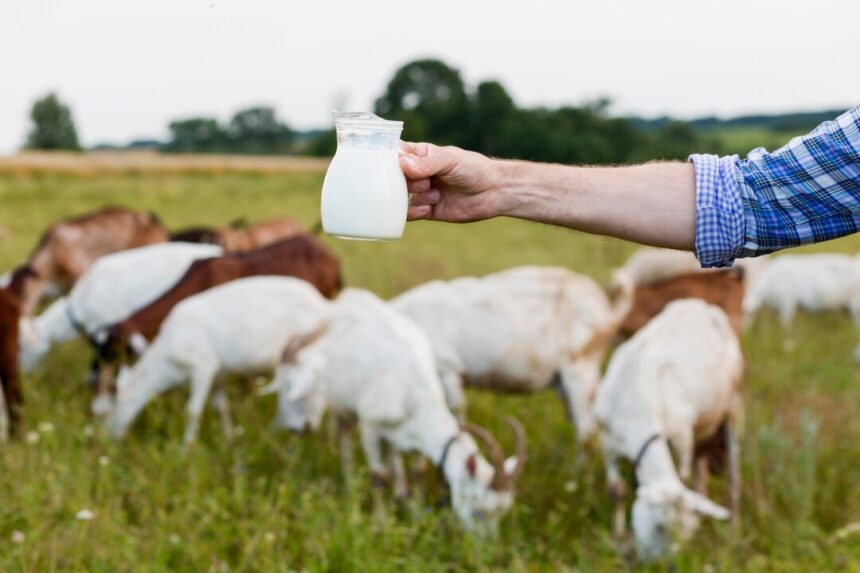Goat farming, once considered a niche enterprise, has gained popularity worldwide due to its versatility and profitability. From producing nutritious milk to supplying tender meat, goats offer a range of products that cater to diverse consumer demands. Whether you’re interested in dairy or meat production, goat farming presents opportunities for sustainable agriculture and economic empowerment. In this article, we’ll explore the journey from goat milk to meat, highlighting the key aspects of goat farming along the way.
1. Dairy Goat Farming: The Milk Producers
Dairy goat farming focuses on producing high-quality milk for consumption or processing into dairy products such as cheese, yogurt, and butter. Dairy goat breeds, including Saanen, Alpine, Nubian, and LaMancha, are selected for their milk-producing capabilities and gentle dispositions. Successful dairy goat farming requires attention to factors such as nutrition, breeding, and proper milking techniques to ensure a consistent supply of wholesome milk.
Breeding and Management: Dairy goat farmers carefully select breeding stock based on milk production potential, udder conformation, and overall health. Proper nutrition, including a balanced diet of hay, grains, and minerals, is essential for supporting milk production and maintaining herd health. Routine health care, including vaccinations, deworming, and hoof trimming, helps prevent disease and ensure the well-being of the goats.
Milking and Milk Handling: Milking goats typically occurs twice daily, with each goat producing an average of 1 to 3 gallons of milk per day, depending on breed and lactation stage. Milking hygiene is paramount to prevent contamination and ensure milk quality. After milking, the fresh milk is quickly cooled and stored under refrigeration to preserve freshness and flavor.
2. Meat Goat Farming: The Protein Source
Meat goat farming focuses on raising goats for meat production, catering to the growing demand for lean and flavorful meat products. Meat goat breeds, such as Boer, Kiko, and Spanish, are selected for their fast growth rates, efficient feed conversion, and superior meat quality. Meat goat farming offers opportunities for small-scale producers and larger commercial operations alike, providing a sustainable source of protein for consumers worldwide.
Breeding and Growth: Meat goat farmers prioritize breeding stock with desirable traits such as muscularity, fast growth, and adaptability to various environments. Controlled breeding programs aim to produce market-ready kids within a specified timeframe, typically around 6 to 9 months of age. Proper nutrition, including access to high-quality forage and supplemental feed, is crucial for supporting healthy growth and development.
Market Preparation: Meat goats are typically marketed based on weight, with market preferences for animals weighing between 50 to 80 pounds for optimal meat quality. Prior to sale, goats may undergo conditioning and finishing to enhance muscle development and marbling. Proper handling and transportation practices ensure that goats arrive at the market in good condition, preserving meat quality and maximizing profitability.
3. Value-Added Products: Maximizing Returns
In addition to milk and meat, goat farming offers opportunities for value-added products that appeal to niche markets and specialty consumers. Goat milk can be processed into a variety of dairy products such as cheese, yogurt, ice cream, and soap, adding value to the farm’s offerings. Similarly, goat meat can be transformed into gourmet sausages, jerky, and ready-to-eat meals, catering to discerning palates and expanding market reach.
Goat farming encompasses a spectrum of opportunities, from dairy production to meat processing and value-added products. Whether you’re a small-scale homesteader or a commercial producer, goat farming offers avenues for sustainable agriculture, economic empowerment, and culinary innovation. By leveraging the unique qualities of goats and implementing sound management practices, farmers can navigate the journey from milk to meat with success, providing consumers with wholesome and nutritious products that nourish both body and soul.
Join 'Farmers Mag' WhatsApp Channel
Get the latest Farming news and tips delivered straight to your WhatsApp
CLICK HERE TO JOIN






